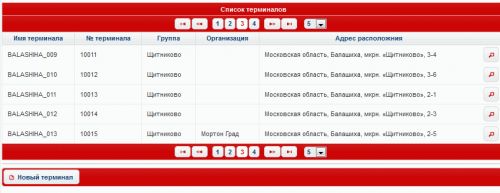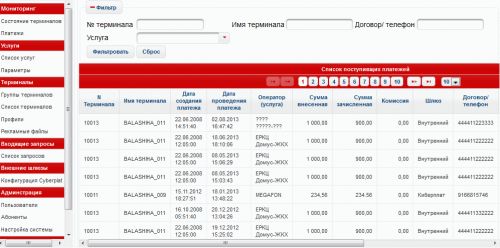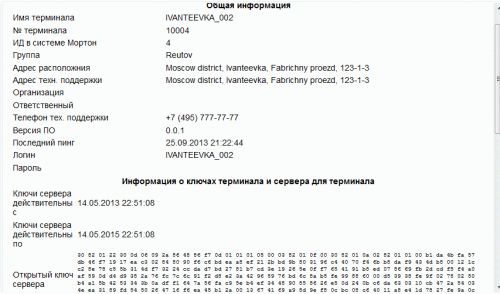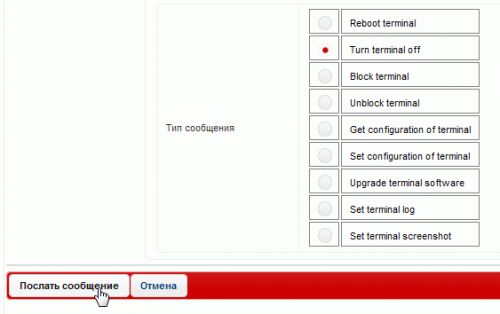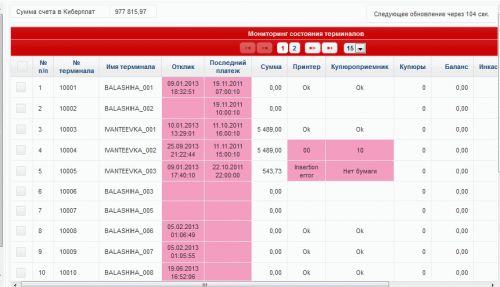Payment Processing System Capabilities
The system implements several user scenarios. Some scenarios work only in POS terminals, others only in the server. Some scenarios require interaction of terminals and server.
Talking about server scenarios, we can mention next ones:
- Building hierarchy of services. Services can be combined into groups which can contain both single services, and other service groups. Usually services are combined into logical groups for the services with similar content. You can define many different hierarchies of services in the forms of POS terminal profiles and assign them to different terminals and terminal groups.
Building service parameters sets. You can define diverse parameters for services and use them as input fields by payers for pointing additional information about payments. For example, you can create a parameter "Phone Number" and then create the service "Cellular Provider" and bind the parameter to this service. As a result, creating a payment in POS terminal for "Cellular Provider", subscriber will input a phone number for sending money to this phone abonent. This enables a flexible approach for creation of custom services. You can easily adapt the payment solution to changing business conditions without writing new software codes and excluding start of new development iterations. - Building service parameters sets. You can define diverse parameters for services and use them as input fields by payers for pointing additional information about payments. For example, you can create "Phone Number" parameter and then create the "Cellular Provider" service and assign the parameter to this service. As a result, creating a payment in POS terminal for "Cellular Provider", subscriber will input a phone number for sending money to this abonent's phone. It enables a flexible approach for creation of custom services. You can easily adapt the payment solution to changing business conditions without writing new software codes and with exclusion of any software development activities.
- Adding gate to external provider services. For registration an external service provider system, you have to add (register) a special module (gate) providing interaction with those system. This gate is a software module which directly interacts with API of the external system, as well as the metadata used for module identification and detailed setup.
- Building a list of POS terminals groups. The system can combine POS terminals into groups (by locations, by organizations, by specific features, etc). Multilevel hierarchy of groups is available. Groups are created by administrators and you can operate with all terminals in the group in the same way as with single POS tyerminals.
- Building a list of POS profiles enables manage by POS profiles, combine them into groups, and assign the profiles to POS terminals.
- Integration with enterprise systems. We can integrate Payment Processing with the legacy systems in your organization by means of scheduled imports and exports (for example, user list, accounting data, addresses, etc). Available manual and automatic data exchange.
- Reporting Capabilities. You can create a report based on one of the existing templates with the purpose of further printing.
- Payment management. You can filter processed payment transactions filtered by custom parameters. Additionally, you can take any payment transaction from history and perform necessary actions for it (such as processing an older payment transaction if POS terminal was failed).
- Building a list of commission rules. You can create a commission rule which can be linked to any number of services. When a payer will create payments for those services, the assigned rules will be used for calculation of a final comission. Comission rules goes to POS terminals within terminal profiles. There are different options for calculation of commissions: absolute, relative, step by step, etc.
- Defining user roles. You can create, modify or delete user roles (so called user groups). Any role defines specific system features which define the capabilities of related users in the system. Thus, you can determine any role with any access rules. For example, they can be "Abonent", "Technician", "Administrator", and others.
- Building user list. You can add new users with a specific access to the system. The user data can be modified and (or) deleted from the system. Each user can be defined based on any number of roles which define an available set of functions for this user.
POS terminals and Processing server interact to each other during next scenarios:
- Creation of a payment determines a process of new payment registration. If the payment is created based on the service of an external provider, then POS terminal will send a payment document to Processing server and to external provider system. In case of internal services, payment document will be sent only to Processing server. POS terminals can accept payments in offline (without connection to server) when all payment info will be sent to server as soon as the connection will be restored, or can be manually moved directly to the server. Creation of a payment usually includes accepting the bills with a bill receiver, and printing a check based on a predefined template.
- Registration of a POS terminal. You can register any number of POS terminals that will avoid illegal addition of alien POS terminals to the system. Registered POS terminals will exchange by encrypted data with the server.
- Running a remote operation on POS terminal from the server when you can remotely execute any of available commands (shutdown of terminal, restarting POS software, locking and unlocking terminal, downloading screenshots, receiving software logs, sending and receiving profiles with services sets, remote upgrading, etc).
- Monitoring POS terminals. This procedure provides information about current status of POS terminals registered in the system. This is displayed as a list of terminals in real time.
- Newsletters. Server can send the news to chosen subscribers. Subscribers can read the news in their private zones in the POS terminals after additional authorization. This feature is only available to registered users in the system.
© 2008-2023 Finecosoft.
